When your baby won’t eat solids, it can be stressful. Learn why your baby is refusing food and how to get them to eat solid foods with 7 simple steps!
Affiliate links used below. See our full disclosure.
The spoon hits the floor.
Your baby makes a nasty face.
They might even shudder or gag.
All from a bite, or an attempt to feed your baby solid foods. It’s totally unexpected when babies respond with such disdain for baby food or table food. As parents, we’re often excited about this new milestone and it’s shocking when your baby won’t eat solids.
In real life though, it’s quite common for babies to gag on solids, seem uninterested, and outright refuse food.
While knowing it’s “normal” for babies to not seem interested in solid foods, even though everyone else’s baby seems to be gulping it down by the jar full, it still leaves the question, “How do you get a baby to eat solids?”
Well, I happen to know a thing or two about that. First, because I’ve personally helped a lot of families get their babies eating solids as a pediatric occupational therapist with over a decade of experience, but also because I’ve been there with my own son…
Going through it as a mom was a whole different ball game.
Of course, I knew that it was normal for babies to refuse baby food when it was first introduced, and I also knew that some babies didn’t much prefer baby food, but my Momma heart was worried. The worrying got worse when I watched my son act like he could’ve cared less about the delicious homemade sweet potatoes that I whipped up, as he turned his face away and threw the spoon across the room.
Meal after meal.
Day after day.
And, week after week.
With each passing day that he refused to eat solids, I got more worried, and more frustrated as I’d watch the food I’d prepared literally go down the drain. There came a point when I knew I needed to do more, to put some of my OT skills to use in my home, and that’s what I’m going to share with you here, because I know how stressful it is when your sweet adorable little baby won’t eat solids.
By the end of this guide, you’ll know :
-
- Why your baby is refusing solids
- Why they used to eat solids, but don’t anymore
- How to get them to eat solids and table foods
- Ways to get them more help (if you need it)
We have specific guides as well for toddlers that refuse to eat and preschoolers and school aged kids that refuse to eat.
Why Your Baby Won’t Eat Solids

There are a lot of factors that can actually play a role in any baby’s refusal to eat solid food. We’re going to walk through each of them below, but know that the reason your baby isn’t eating solids could be any one or combination of them. With a little detective work, you’ll figure it out!
Also, age has a little do with it, and will help you hone in on what’s going on.
6 or 7 Month Olds That Refuse Solids:
-
- Baby isn’t ready yet – 6 months of age is the perfect time to introduce baby to solid foods, but sometimes the baby isn’t ready. Actually, this is really common when the baby is closer to 4 and 5 months old if you’re starting a little earlier, but is still totally normal at 6 months of age.
Babies are still learning how to move their tongue and bring toys to their mouth, which helps them get used to having foreign objects in there. Each baby is unique and yours may just need some practice if they are in this age range.
They also may still be developing good trunk and head control, without it, eating is difficult!
Check out the American Academy of Pediatrics recommendations for introducing food and make sure your baby is ready for solids. You can also find my guide to Introducing Solids with more details on milestones to look for when 6 months old.
-
- A strong tongue thrust reflex – Most babies usually lose this reflex that helps them not choke if something accidentally gets into their mouth around 4-6 months, but it may linger for some.
If you notice that your baby still thrusts their tongue out every time you touch the spoon to their lips, they may need a little more time. It’s really hard for them to eat when they keep shoving their tongue out of their mouth!
-
- Doesn’t like the way food feels – Solid food is something so new and unfamiliar to babies, it can take a while for them to get used to the new texture in their mouth. Many babies do in fact get used to the feeling of solids, but some don’t.
Read more about that below under sensory.
8, 9, or 10 Month Olds That Refuse Solids:
-
- Sensory – By 8 months of age, most babies are ready from a developmental standpoint, and at this age, it’s definitely time to get the ball rolling, but some babies (like my son) still refuse. One of the most common reasons why older babies still won’t eat solids is because they don’t like the texture.
This boils down to the way their brains are thinking about (or processing) the sensory input they feel (aka the food in their mouth).
This isn’t a bad thing and doesn’t necessarily mean they have any kind of diagnosis, but it does mean we need to take some extra steps to help them tolerate the texture of food better. You can head to sensory issues with food to learn more.
Babies that are sensitive to different textures usually gag immediately at the sight, touch, or taste of food.
-
- Coordination – Eating actually requires a lot of muscle coordination from opening the mouth, pulling food off of a spoon, closing the mouth, and effectively swallowing.
We take this for granted and don’t even think about it, but for some babies, it just isn’t coming natural.
Babies that are having difficulty with coordination, or oral motor skills (find exercises with that link,) usually gag when trying to swallow or after getting the food into their mouth.
Or, the food may fall out frequently, and babies won’t eat solids because they just don’t know how. When they don’t know how to eat, it isn’t that fun, and there isn’t a lot of interest.
If gagging is something you’re concerned about or is happening often, read more in guide on baby gagging.
-
- Food allergies – Believe it or not, sometimes babies will avoid certain types of foods because they’ve associated an upset tummy with the yogurt or cheese for example. It doesn’t happen all the time, but it’s something to consider, especially when it’s very specific allergenic food.
The most common types of food allergens are dairy, egg, soy, wheat, tree nut, peanut, fish, and shellfish. Severe eczema is another indicator that food allergies might be present.
Sometimes, signs become more obvious when cow’s milk is introduced.
-
- Not into baby food – While this is probably the least likely reason your baby is refusing solids, it is possible.
If you’ve consistently offered baby food or infant cereal with no interest from your baby and you don’t see any of the sensory or coordination signs we talked about above, then you might just might want to move on to table and finger foods.
One way to do that is using a Baby Led Weaning approach, before you do that though read my BLW pros and cons.
Why Baby Won’t Eat Solids Anymore (They Used to?)
-
- Some teething babies won’t eat – While it’s not as common, some babies start off eating baby food and then suddenly stop. A frequent cause of this is teething, and some babies teethe for a very. long. time. If your baby’s teeth are swollen, red, and seem to hurt, then this is likely the cause.
Try putting some teething gel on their gums 15-20 minutes before a meal. If you see an improvement, this is likely the culprit. Here’s a natural teething gel I like, but check with your doctor first.
-
- Going through a phase – Babies may get a little bug or slight cold that we aren’t even aware of or have some negative experience with food that seemed too minor to us as the parent, but makes them leery of eating.
If it’s the latter, some sensory sensitivities can develop if a baby goes for a while without eating any food. If this is the case for your baby, you’ll want to follow the steps below and focus on not pressuring your baby to eat. It’s really important that mealtimes are a positive experience.
-
- They’ve outgrown baby food – If your baby is later in their 7th month or older, they may just be sick of solid baby food and ready for the real deal table and finger foods. That may mean it’s time to change up baby’s diet!
I know that seems scary and makes some parents nervous. Don’t worry though, if you think this is why your baby suddenly won’t eat solids anymore, then head to how to transition to table foods.
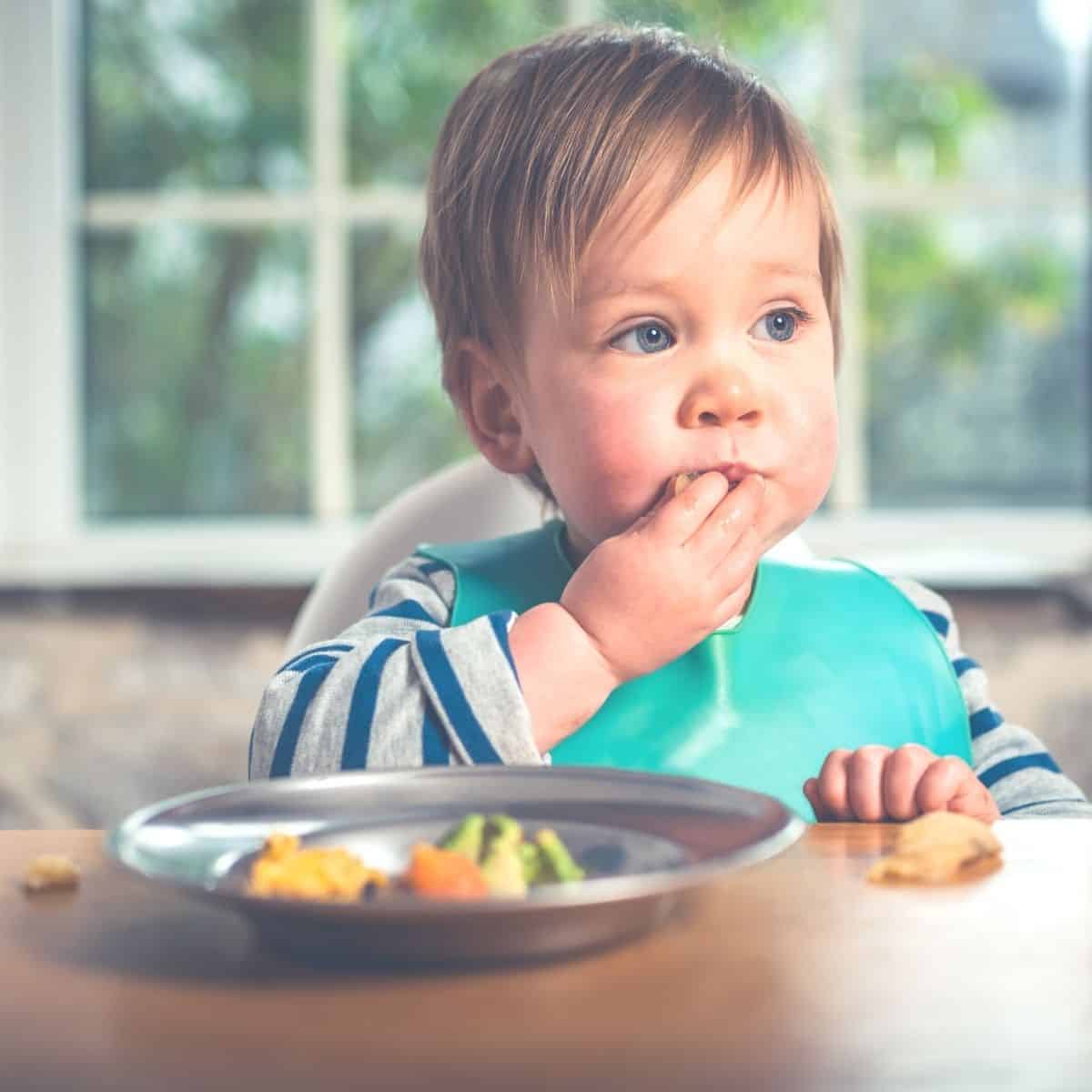
How to Get Your Baby to Eat Solids
1. The absolute first thing I do with a baby not eating solids is to put a scoop of baby food or some other pureed food like yogurt onto the tray of their high chair.
I know, the mess. It’s soooo important for babies to get messy though! If you’re skeptical, you’ve got to read: Why Babies Should Get Messy Eating. It will totally change your perspective and give you the inspiration to embrace the mess.
2. Encourage your baby to touch the food, but don’t force. Be silly and keep it light. Demonstrate.
If they refuse, try and try again. In fact, at every single meal, put a dollop of that food on their tray or even in a bowl that they can play with and touch. If they won’t touch after a few attempts, offer a spoon for them to stick into the food too.
This is one of my favorite beginner spoons that makes it really easy for baby to get some food onto it.
3. Once your child touches the solid food, you’re on your way! Allow them to touch, spread, and put it all over the tray and themselves. This is wonderful for their sensory processing and will make a huge difference in helping them get used to the texture of solids.
If they get upset once they’ve touched the food, or that they are now all messy, be very calm and reassuring.
Have a wet washcloth ready and quickly wipe them down. And, if this is how they respond, it’s a sign that you need to practice playing with these foods a lot! The more they touch and interact with the food, the closer they’ll be to eating it.
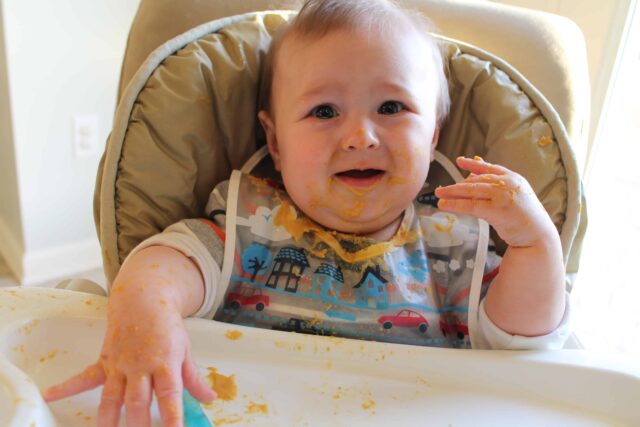
4. When baby has the food on their hand and they’re at least tolerating it, show them how to take their hand to their mouth, so they can taste it. You may need to demonstrate if baby won’t let you guide their hand.
Repeat this several times. After they eat from their hands several times, offer them some solid foods from a spoon.
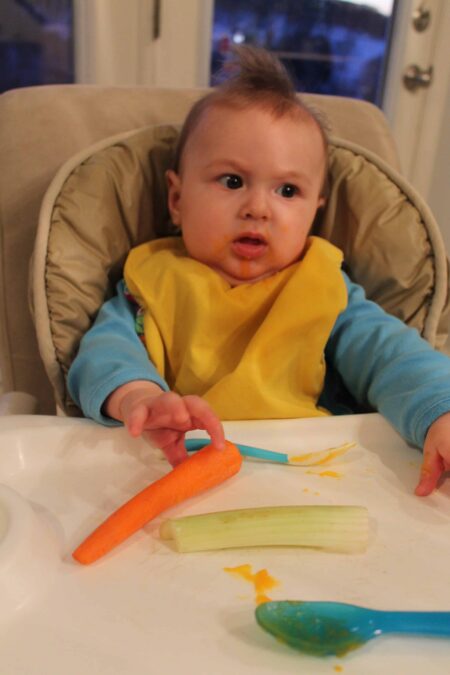
5. You can also give them a large whole raw carrot or celery stalk at meals. I mean the whole darn thing. The point isn’t for them eat it (and if they can get pieces of it off, take it away), but for them to put it into their mouth.
When they do this, it helps desensitize their gag reflex and they get to practice biting, chewing, and moving their tongue around. It’s amazingly powerful and can make a big impact in a baby accepting solid foods. Make sure you demonstrate and keep offering at every meal.
6. Be consistent and patient. I can’t stress this enough, even though it’s often easier said than done! Have regular meals and follow the above steps 1-3 times a day for every meal. You can find sample schedules for babies ages 6 – 7 months, 8 – 10 months, and 11 -14 months if you’d like a guideline to follow.
7. Focus on meals being positive experiences for the baby, even if they aren’t eating anything. As parents, we can bring a lot of stress with us to meals, which can be hard to hide. But, this is definitely a “fake it til you make it” kind of situation.
Take a deep breath, put on a happy face, and work on the above steps. Going into the meal with no expectations of them eating anything will also help keep your frustration level down.
I highly recommend grabbing a seat in my free online workshop to help learn more…
In it, you’ll learn 5 Easy changes parents can make to help babies and toddlers eat table food well! It’s an eye opener and will help you take steps to give them the best start with eating table foods well (even if it already isn’t going well):
Strategies to Use Outside of Meals for Baby’s Refusing Solids
There are a few really powerful strategies you can use away from the highchair that will directly impact your baby eating solids during meals. Might seem strange, but if you suspect your baby is refusing because of sensory or coordination difficulties, doing these activities can be total game changers:
-
- Brush their teeth – If you haven’t started yet, brush their teeth, and when you do, make sure you’re getting all over their gums and the sides, as well as the top of their tongue.
It only takes a few seconds, but it helps to both desensitize their mouth and improve coordination because the tongue gets practice moving in different directions. If your baby doesn’t like it, take it slow, and try often.
The more often you brush, the bigger the effect. Try for one to three times a day, and consider a vibrating toothbrush (yes, even for babies) for more powerful input in their mouth.
-
- Play in sensory bins – That may be a new term to you or you might be wondering what the heck that has to do with eating, but playing in different textures is super powerful and helps the sensory system understand different textures better.
This correlates directly to eating. I can’t tell you how many times I’ve seen a kiddo that plays in sensory bins frequently, suddenly start eating more foods (my son included). Head to Sensory Bin Ideas to learn how to set one up.
-
- Chew on toys – So many babies that won’t eat solids never put toys or teethers in their mouth, which is really easy to overlook. If this is your baby, pull out a bunch of different teethers and have them around the house.
Demonstrate. Dip them in food or juice. Play with them in the bath. The more often they get teethers and toys into their mouths, the more it will help improve the coordination their mouth muscles need to eat and desensitize their gag reflex and sensory system.
I really love this teether because it gets in the back of the mouth and this one vibrates (all my friends get it from me at their baby shower).
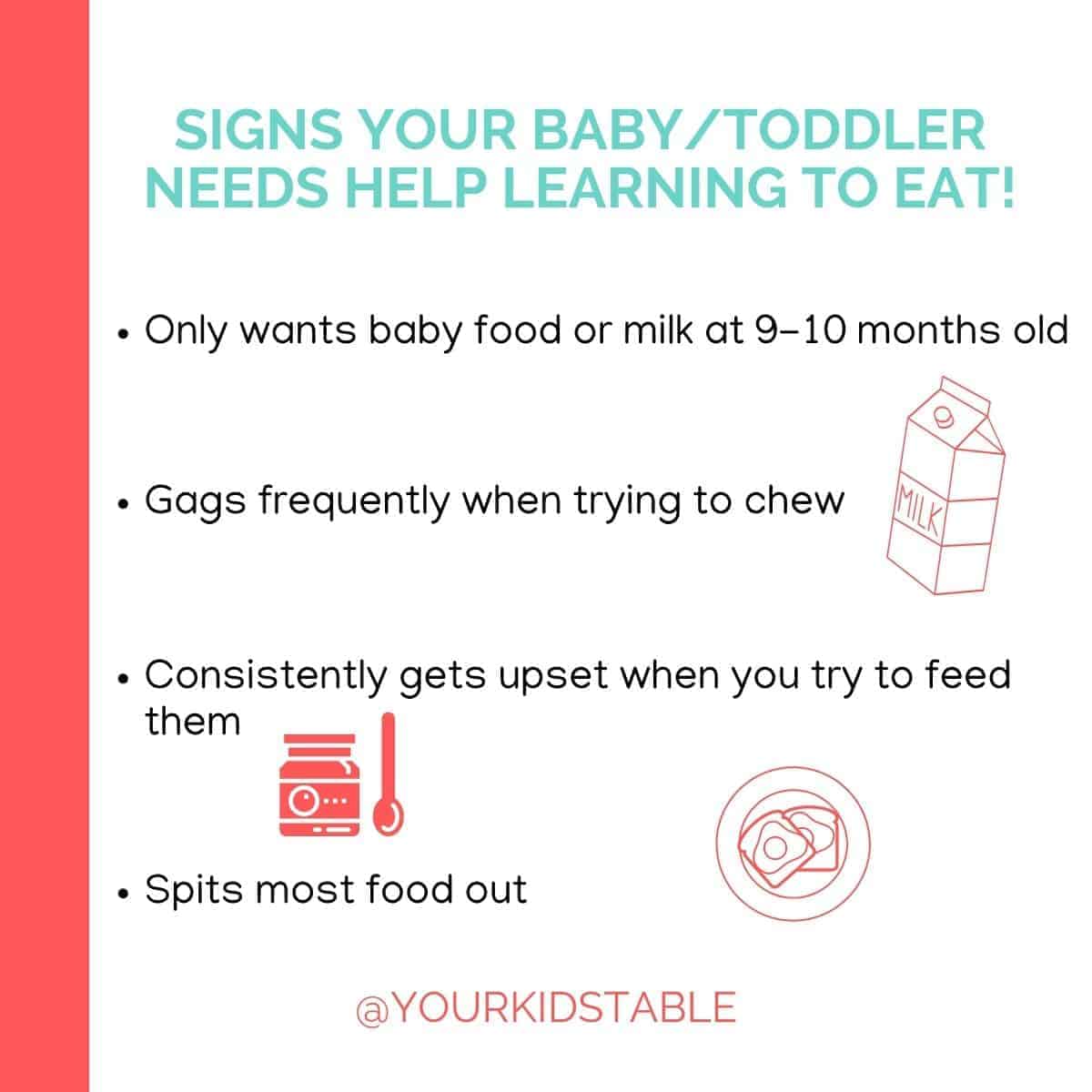
Help for the Baby Not Eating Food
I’m not just talking about solid baby food or purees. You may have a baby that won’t eat any type of food, like puffs, cut up fruit, or toast. They’re getting older and older. You’re getting worried.
Following the above steps will be incredibly important for your babies too, especially the strategies for outside of a meal. But, you’ll also want to use the steps I outline in getting your baby to eat table foods.
That’s a whole different animal all within itself, and there are some targeting tips that can make all the difference in your baby eating food.
You’ll want to focus on small pieces, and by 9 months of life be attempting table or finger foods.
While I don’t want you to worry, I know it’s tempting to keep waiting it out, and unfortunately, some doctors advise this quite often. This often does not help your baby to learn to eat wide variety of foods.
Babies instinctively learn to chew between roughly 8 and 11 months of age, when they move past that, it can be much harder for them to accept foods. It’s not impossible, and the same steps apply for older children, but it’s much better to be proactive then taking a “wait and see” approach.
Puffs, lil cheese curls, and baby mum mum’s are all great for baby’s first foods.
When to Get More Help for a Baby Not Eating Solids
If your baby doesn’t like solid baby food and won’t accept any table foods of finger foods by 9 months old, it’s a good idea to get an evaluation either from the free early intervention program in your state or from a feeding therapist.
You can also read more about typical feeding milestones for babies just to have a reference point. As I said earlier, all babies develop at a different pace and needing a little more help is very common.
Get My Free Printable: Learn to Eat Table Foods Cheat Sheet
There seem to be more questions than answers when you’re under the daily stress of your baby or toddler not eating table foods. Not to mention all of the well-intentioned bad advice that’s often given. Let’s clear that up.
I’ve created a free 4 page guide that clearly lists the steps to teach your baby or toddler to eat table or finger foods, plus a FAQ guide for parents to ease their worries when their babies won’t eat!
More on My Baby Won’t Eat Solids
How to Teach Your Baby to Self-Feed
How to Teach Your Baby to Drink from a Straw
The Best Mealtime Utensils and Tools for Babies
Click here to Pin This! (You’ll have as a quick reference)
Alisha Grogan is a licensed occupational therapist and founder of Your Kid’s Table. She has over 19 years experience with expertise in sensory processing and feeding development in babies, toddlers, and children. Alisha also has 3 boys of her own at home. Learn more about her here.
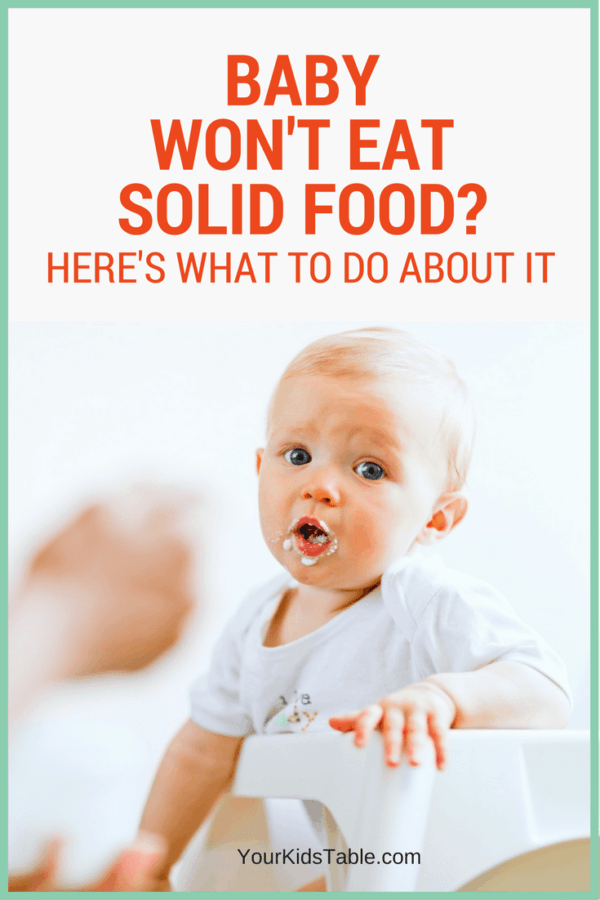

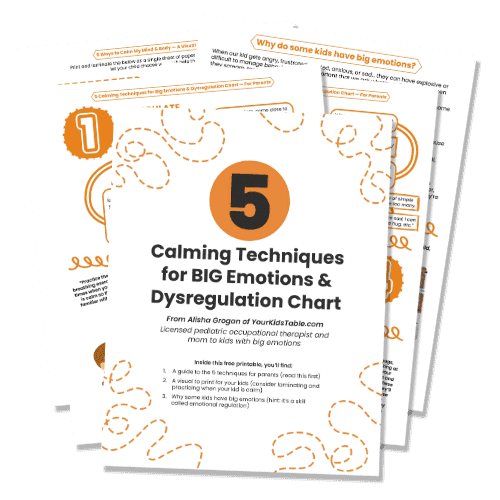
I have a baby girl 5 months old, only milk is what she’s getting, I tried cereal she did kind a eat very little of it, two times a day, one in the morning and dinner, in between hours she takes bottles of similac. Now we tried giving her banana baby foods she don’t like it, one time she puke after tasting baby food banana flavor. I will try some of the routine that you guys are suggesting, and will let you know what worked best with my girl. I will also be praying for us all baby mama’s and dads. thank you all.
Wishing you the best. She’s still a little young so you have time but it will help her so much that you’re being proactive! Thank you for the prayers:)
Hi Alisha, my 12 month old daughter is just now being introduced to feeding herself. She takes a few pieces of food in her mouth and swallows/chews it just fine. The only issue is she will start crying after sitting in her high chair for 10 mins and beg me to carry her. When I do pick her up she refuses to grab the food and instead has me do it. That’s how she basically finishes her meals. How can I get her to finish feeding herself and sit in her high chair? .
It sounds like you guys are in a bit of a routine. I’d try (if your not already) sitting with her and eating at the same time, try to make it an event. Be silly, sing some songs to help keep her mind off of being held- before she starts to get upset. If there’s anyway you can change up her routine a little I’d think about that too. If you live somewhere warm, eat outside, or in another room if you can.
Hello my son is a year old he doesn’t eat solid, just baby food that’s maize cereal and milk, he fights when ever I try putting solid in his mouth, he hasn’t start walking, am thinking of weaning him so he starts eating solid, will it have effect on his walking ? Or his health, am confused..
Hi Sandra,
Thanks for reaching out! Weaning is such a personal decision. If you decide to keep nursing, your little one can still learn to eat table foods! We have a sample meal routine for 1 year olds that you might check out. We also have a table foods free workshop. It is really helpful in teaching your little one to eat table foods. You can save your seat HERE. I hope that helps!
Best,
Andrea
I really needs help for my 5 yrs old son who don’t want to chew or taking any solid foods. Have tried a lot from varying all foods, from rice to buns to veges just name it. He won’t eat solid foods. He can eat ‘soft’ plain rice porridge only. No meats or ‘hard particles’ inside that may triggered him to vomiting. He was so small compare to others. Please help me. Any body know other food that just like a cereal of porridge with high nutrition? Please let me know. Thanks.
Roy, I’d check out this post, it’s a step by step tutorial:
HI i have a premature baby 10 months old. he doesn’t want to eat solid food. he like breast milk a lot. i’m not the one looking after him during the day. help me i don’t know what to feed him anymore.
Hi Jenny, check out the above link for transitioning to table foods, I would start with one of those foods and still give him foods 1-2 to times a day. Keep it as pleasant as possible. I’d also check out feeding therapy in your area (link above for this too).
I’m having trouble with my 7 month old son feeding. .
Every time I go near him with puree food he refuses it ..
He will only ear finger food like puffs and buiscuit
I’d try the idea I shared in the post about getting them to touch the puree with it being spread on their tray and playing on it. Then directing their hand to their mouth!
My son just turned 8 months old. When we first introduced baby purees he loved them, had no issue eating them at all and ate a ton. That didn’t last long. He then refused it. I can sometimes get him to eat it, but not a whole lot. He doesn’t have any issue with the spoon and eats it very well. HOWEVER he mostly refuses it. So I’ve tried some finger foods. He just gags then throws it up. He shows absolutely no interest in it. I’ll put food in front of him and he picks it up plays with it but won’t bring it near his mouth. I’ll put a puff in his mouth and he spits it out. Everything I’ve tried he spits out or food like rice husks he’ll “choke” and throw it up. He really has no interest and he used to eat baby purees like a champ! Now he’ll only eat sweet potato puree and only a little and has no interest in any type of food whatsoever.
So frustrating Stephanie! I’d definitely head over to my post on transitioning to table foods. Pay close attention to use stick shaped foods and teethers for him to mouth on. Also, where to place the puff so decrease gagging.
I feel like such a awful mother. I listened to my husband when he didn’t want me to start adding cereal to breastmilk and only wanted him breastfeeding. Now he’s 22 months and won’t eat anything except oatmeal cookies or Cheeto puffs. I hate it! I tried to get baby puffs and he hated everything. I tried making oatmeal cookies and adding sweet potatoes and carrots but he knew. He won’t even take a bottle with breastmilk. I’m not into junk food! This is just him in the grocery store seeing this colorful bags and screaming bloody murder. I’m hoping to try any of these! Please anyone a prayer I would love oh so much!L! Will let you guys know soon!
Hi, I have seven month old twins, one of them eats puréed food really well but the littler one purses his lips when I try to feed him. He will put his own spoon in his mouth so I try to put food on that so he is at least tasting it. He loves loves loves holding onto chicken drumsticks (nothing left for him to choke on just the flavour) and he will “eat” carrots and rusks. I really want him to eat his purée! He sees his brother eat and seems interested in anything I’m eating or drinking but won’t have a bar of me feeding him purée. Thanks!
I’d trying that playing in it trick Penny! Sounds like your doing a great job though, keep trying without any pressure!
Thank you so much for this wonderful guide! After reading this, I believe my 8 1/2 month old (7 months adjusted age) has sensory issues with food. My question is should I move backwards to thinner foods to promote a positive eating experience for him and minimize his gagging (while doing the tethers, sensory bins, Whole Foods, etc that you recommend)? Or would it be better to push him to try more texture to stimulate his senses? Right now he breastfeeds and rarely accepts baby cereal (more likely to accept it if very thin, more likely to refuse if thick at all. Won’t tolerate any lumps, textures, rice husks, etc).
Ok, thanks very much, I will follow your suggestions. I forgot to mention that he puts everything in his mouth but just won’t let anybody else put stuff in his mouth.
That’s actually a good thing! You want him chewing on different as much as possible, definitely give a bunch of different teethers to use!
Hi Alisha,
My son is almost nine months old and has never let me feed him any kind of puree with a spoon. He gets very angry when I get puree into his mouth against his will. He will take finger food to his mouth and chew off a bits very happily but then is unable to swallow them or spit them out so again gets very frustrated and upset. He will spend an hour with little bits of food towards the front of his mouth crying and getting frustrated on and off but will very rarely swallow the little bits of food. Sometimes I will take the food out of his mouth for him but he hates that too. He won’t let me put any food in his mouth. He won’t drink or breastfeed while there are little bits of food in his mouth. He gags occasionally but not often and rarely spits the food out. Once he vomited the food mixed with milk. Do you think that he has a sensory issue or motor skills issue?
Thanks very much.
Catherine
It could be both Catherine, but oral motor is most likely a component because he can’t get the food out and is having difficulty swallowing. I’d definitely get a feeding eval set up, this is the perfect age! A therapist will be able to give you some specific direct advice that could change things around quickly. I’d also follow the tips in this post and this one on baby gagging, even though he doesn’t gag this will be helpful too!
These are great tips! My son, who is almost 3, is averse to anything but his bottle. We are in feeding therapy as well as OT, Speech and ABA. Nothing except his bottle goes to his mouth, usually. Recently, though he is putting foods to his mouth and kissing/licking them! These foods are like crunchy, long, cheesy flavored foods. This is a great step, but now we need to move on to the next. He doesn’t know how to chew, won’t take anything other than his bottle and isn’t willing to try.
Hi Olivia, thank you! It sounds like he has some oral aversion, I’m sure you’ve heard that term! I’d also check out two other posts that have specific strategies for older kids the first is about oral sensory and the second is oral motor exercises.
I’d also really focus on toothbrushing! That can go a long way in breaking down that sensitivity.
My almost 1 year old will eat any kind of crunchy snack like cheerios, puffs, crackers, biscuits (sometimes he will eat cut up toast) and stage 1 and 2 purees. I’ve been giving him soft table foods for the last month but have made no progress, it gets thrown on the floor immediately. I’ve also stopped giving him the purees hoping he will eat more table foods but it hasn’t made a difference. We try to eat as a family together but he’ll scream in his high chair the whole time and throw all his food on the floor. I’ve tried giving him a preferred food (some kind of crunchy snack) along with the table food and he will eat just the crackers and won’t touch the rest.
I am only breastfeeding him 3 times a day now (after breakfast, after lunch and before bed) He is barely eating anything so he is hungry and cranky all the time. Sometimes before bed I will give him cheerios and he will eat so much of it, meaning he is starving. Should I give him baby puree food after he eats his crackers to fill him up? I’ve tried everything and I feel like I’m going nowhere.
Hey Natalie, I love how proactive you’re being, that’s really important. Have you seen my post: how to transition to table foods. I think this will be really helpful for you. It has step by step. I’d pay particular attention to the tooth brushing and using soft foods in the shape of cubes. I’d also expand on his crunchy foods, buying as much variety as you can. Think about breading soft foods and trying chicken nuggets, etc.
I observed with interest recently as my second-born daughter (who continues to nurse her daughter usually once a day, at age 20 months), waited to introduce solid foods until long after that 4-6 month recommended time, and then completely skipped the puréed stage of foods, providing first a large piece of carrot or some other food to chew on. Breast milk remained my granddaughter’s main source of nutrition, while regular, healthy table foods were introduced as she sat with Mom & Dad at their mealtimes. I thought, “Well, look at that! They certainly didn’t help out the baby food industry or the pureé-ing gadget companies like my other kids did!”
My son refused solids until he was 10 months old, and even then didn’t like them much and didn’t eat much. He initially started by eating purees off my finger at 9 months old and we progressed from there. We eventually (at 13 months) had to cut back on breastfeeding some to get him to take more solids. He didn’t gain weight between 9 and 12 months. By letting him play with foods, feed himself, and have other sensory experiences, he is now 26 months old and eats normally (although I would say he tends towards picky and isn’t a big eater). He is small but growing. It’s hard work and stressful but keep at it!
THANK YOU Tiffany for sharing your story! I love your finger tip, that’s brilliant! This will be really encouraging and helpful to other parents. Great work!!
Hi, I noticed that you only offer 3 breastfeeds a day in this plan.
My 7month old, feeds roughly every 2 to 3 hours day and night, how do you stop them from feeding so much to put them into this sort of routine?
Hey Sophie,
Every child is different! However starting to offer some meals as well throughout the day so they can start to work on that transition to solid foods can help, but you would be trying to offer the breastmilk with the meal (if you are working on decreasing feeding from the breast).
Hope that helps!
Best,
Desiree